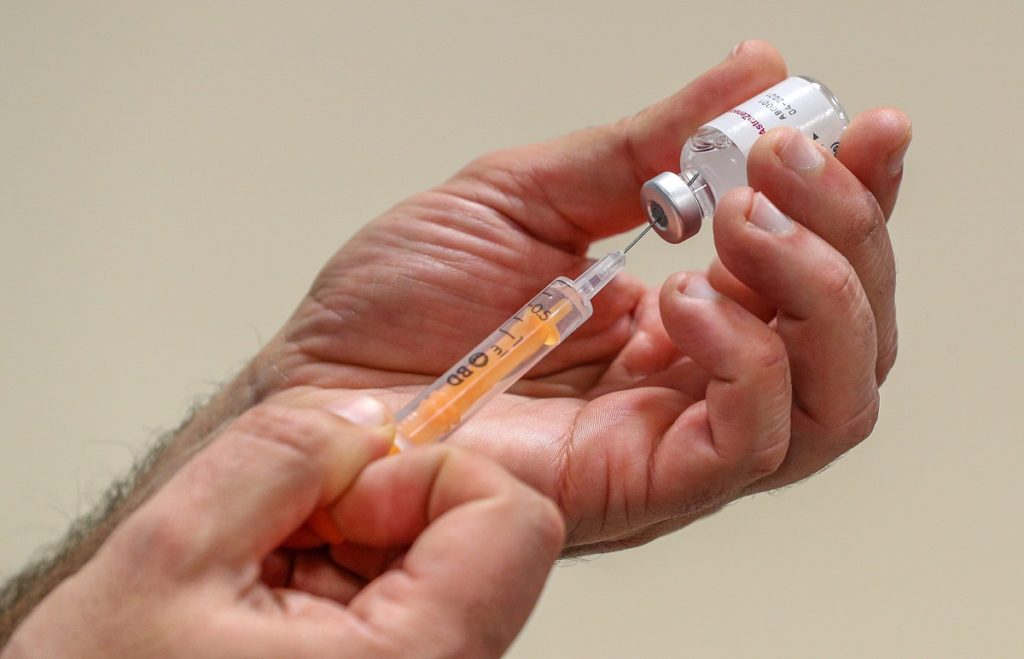This week the British government attended a meeting of a little-noticed World Trade Organisation (WTO) council which has potentially huge implications for our global response to the covid pandemic.
Outside of industry, trade specialists and access to medicines activists, the WTO’s ‘TRIPS Council’ has a small public profile, which is directly at odds with its huge influence in terms of how we respond to covid. It is no exaggeration to say that the discussions at this body may generate a decision by the WTO which will determine whether or not we continue to fight the pandemic with one hand tied behind our backs.
To see why this process is so important, we need to understand how its area of focus – intellectual property (IP) – plays a pivotal role in the pharmaceutical and medical industries and, by extension, who does and who doesn’t get access to vaccines, treatments and equipment.
When pharmaceutical corporations develop a new medicine or vaccine, they can be granted 20-year monopolies through patents. These IP rights, including patents, allow these corporations to charge whatever price they like during this period by blocking other manufacturers from producing and supplying more affordable versions. This “blocking” element not only keeps prices high, but it also limits available global supplies.


One thing that this global pandemic has shown us is that monopolising and limiting available supplies of medical products is very dangerous, particularly when the whole world needs access to these products at the same time. Already, patents on personal protective equipment (PPE) have limited the amount of protective equipment available for healthcare workers. Patents on a potential covid treatment have led to rationing on the NHS.
For years, Medecins Sans Frontieres’ medical teams have witnessed lives lost whilst waiting for the medicines and vaccines that they need. IP barriers on HIV treatments led to a 10-year delay between when people living in Africa got access, compared with those living in the US. This led to 12 million unnecessary deaths between the late 1990s and mid-2000s.
The pharmaceutical industry often claims that it relies on the IP system to deliver innovation, but IP protection can also limit supplies on health products, particularly during a pandemic. This not only hinders our efforts to save lives; it is also unnecessary. Over 100 governments around the world agree, the vast majority from low-and-middle-income countries. A proposal from South Africa and India at the WTO seeks to temporarily waive IP rights on covid health technologies. The aim of this is to open up the knowledge and technologies scientists are gaining about covid around the world, to boost local production, maximise supplies – and ensure that everyone, everywhere, can access the new innovative and lifesaving covid medical tools they need.
Unfortunately, due to the impact this would have on monopolies and prices, the pharmaceutical industry is lobbying heavily against this proposal. The talking points of many of the high-income countries, including the UK, who oppose this proposal are also very similar, and likely come directly from pharma lobbyists. One thing most of the opposing countries have in common is the national presence of multinational pharmaceutical corporations. Central to their argument is the assumption that if you take away IP, you take away the incentive to innovate new medicines.
Understandably, many beyond the industry have taken this argument seriously. But the covid pandemic is laying bare something that undermines these decades-old claims: the central role of public funding and public research institutions in drug development. It is clear that IP was not the incentive for pharmaceutical companies to get involved in the development of the lifesaving covid treatments and vaccines that we are starting to see become available. The incentive was more likely to be the huge amounts of upfront public money, as well as the bulk of the research already completed by scientists working in public institutions and universities, handed to them on a plate.
And you don’t have to take this from me – AstraZeneca themselves made clear to investors early in the pandemic that they had nothing to worry about when it came to the company’s ostensibly risky approach to the covid vaccine, because “expenses to progress the vaccine are anticipated to be offset by funding by governments”. In short, they may have been taking risks, but they were doing it with our money.
However, these corporations now own the IP rights to many of these publicly-funded products, and are able to monopolise the market, control the number of suppliers, and charge high prices around the world.
The IP waiver on COVID-19 technologies is not only a common-sense proposal for these unprecedented times, but it may also be our only chance to maximise access to these medical tools. Hundreds of civil society organisations, including MSF, have asked pharmaceutical companies for months to give up their IP made possible with public funds, and openly share their technologies with others around the world. They have clearly and shamelessly responded that they are not willing to. They won’t even be transparent about how they are spending our public money, and how much profit they intend to make from it.
The pandemic has made us re-evaluate many things. The IP system and how it relates to medical products is one of them. This system, designed by pharmaceutical companies themselves to maximise profits, is no longer fit for purpose in a world that is harshly realising the importance of access to healthcare for all. The UK should realise that the pharmaceutical industry is peddling outdated talking points; the rest of the world is starting to see the cracks. They should make sure they are not left behind and support the proposal for an IP waiver on covid technologies at the TRIPS Council.









